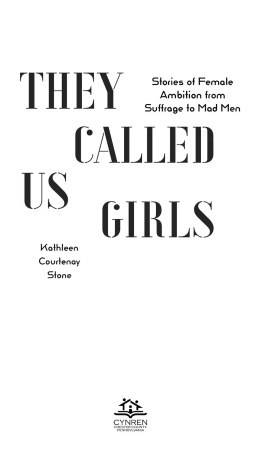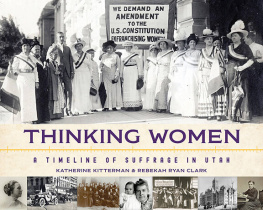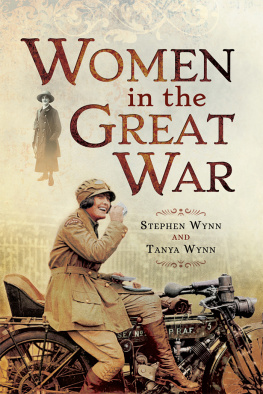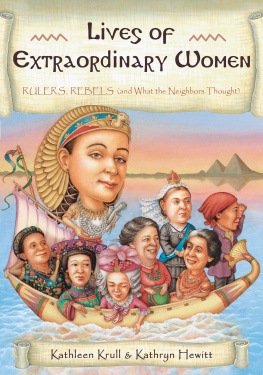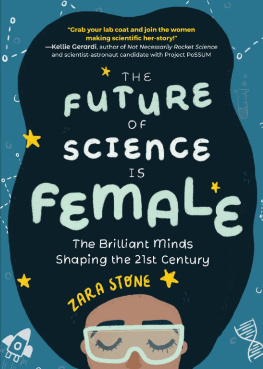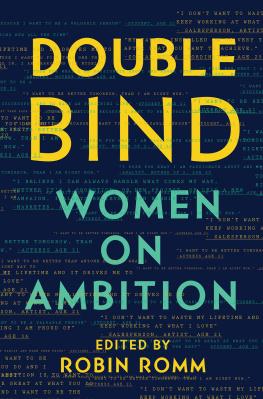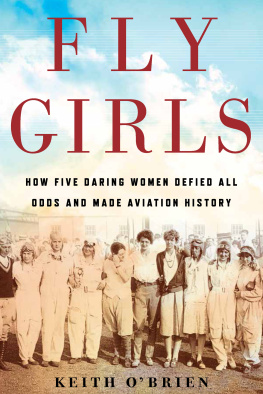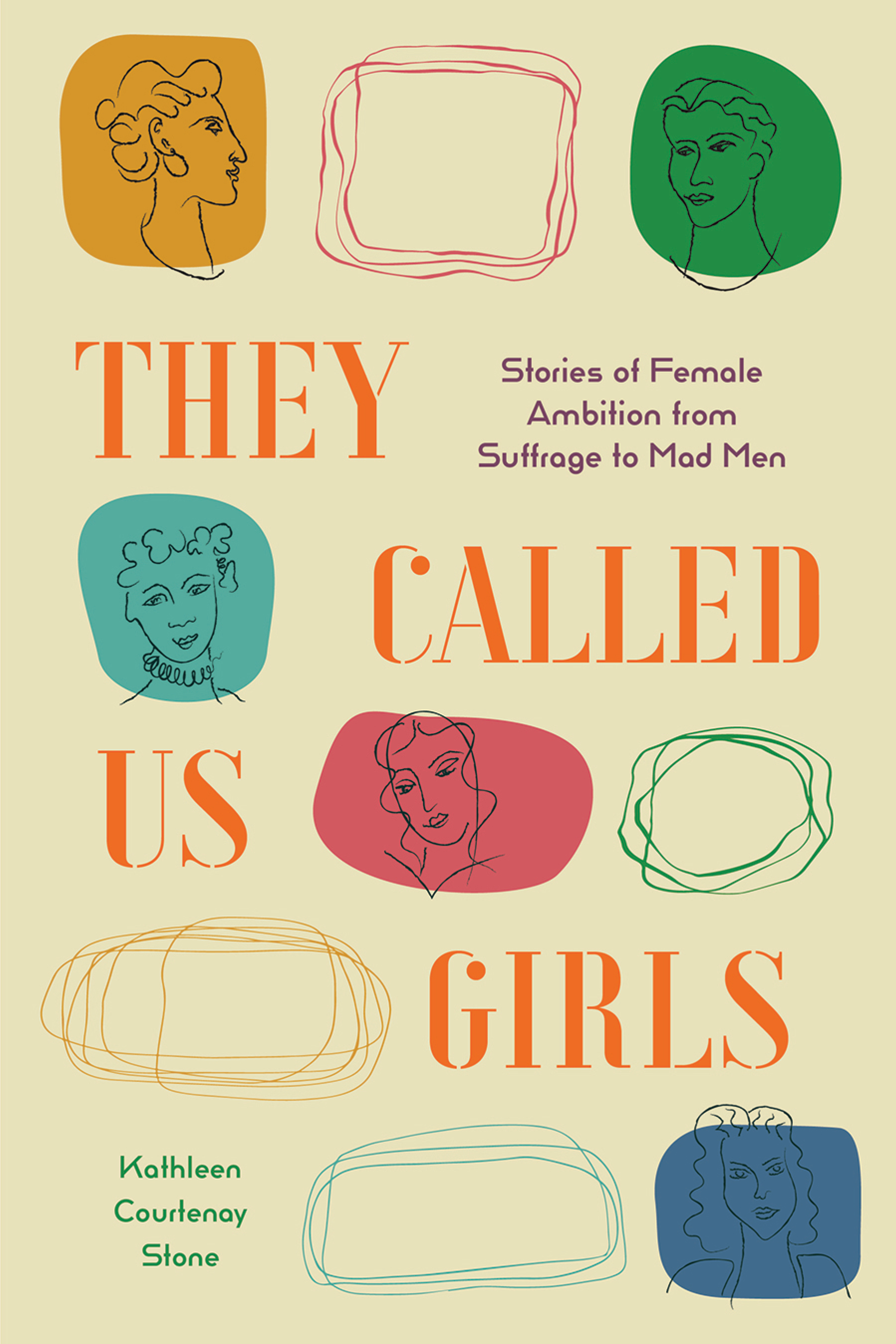Published by Cynren Press
101 Lindenwood Drive, Suite 225
Malvern, PA 19355 USA
http://www.cynren.com/
Copyright 2022 by Kathleen Courtenay Stone
All rights reserved. No part of this publication may be reproduced, stored in a retrieval system, or transmitted, in any form or by any means, electronic, mechanical, photocopying, recording, or otherwise, without the prior written permission of the publisher.
First published 2022
ISBN-13: 978-1-947976-24-5 (hbk)
ISBN-13: 978-1-947976-25-2 (ebk)
Library of Congress Control Number: 2021942058
For information about special discounts for bulk purchases, please contact Cynren Press Sales at (484) 8753113 or sales.media@cynren.com
Cynren Press has no responsibility for the persistence or accuracy of URLs for external or third-party internet websites referred to in this publication and does not guarantee that any content on such websites is, or will remain, accurate or appropriate.
Every effort has been made to trace the ownership of copyrighted material. Information that will enable the publisher to rectify any error or omission in subsequent reprints will be welcome. In such cases, please contact the publisher at press@cynren.com.
Cover design by Emma Hall
For my sister and my mother
Contents
Illustrations
1.1 Dahlov Ipcar in her studio, 2011
1.2 Marguerite Zorach, Block Castle, 1921
1.3 Marguerite Zorach, Dahlov and Tooky, 1930
1.4 Dahlov Ipcar, Winter in Maine, 1935
1.5 Dahlov Ipcar, Boy in Window, illustration from Lobsterman, 1962
2.1 Muriel Petioni as a young girl in Trinidad, undated
2.2 The Petioni family, circa 1933
2.3 Muriel Petioni as an intern at Harlem Hospital, circa 1937
2.4 Muriel Petioni with her son and daughter-in-law, circa 2008
3.1 Cordelia Hood as an older woman, circa 2006
3.2 Cordelia Hood as a young woman, undated
3.3 Cordelia Hood and Emilio Pucci, undated
3.4 Cordelia Hood, undated
3.5 Cordelia and Bill Hood, undated
3.6 Cordelia Hood and my family, 2002
4.1 Polio patient in an iron lung, undated
4.2 Martha, Lee, and Lauren Lepow, 1958
4.3 Martha and Lee Lepow, circa 1984
4.4 Dr. Martha Lepow and Dr. David Clark holding newborn twins, 2000
4.5 Martha Lepow and her daughter, granddaughter, and great granddaughters, undated
5.1 Mildred Dresselhaus in her MIT office, undated
5.2 Mildred Dresselhaus and her four children, undated
5.3 Mildred and Gene Dresselhaus in La Napoule, France, 1977
5.4 Mildred Dresselhaus at the White House, 2014
6.1 Frieda Garcia, her mother, and her brother, passport photo circa 1941
6.2 Teen Time cover, August 1962
6.3 Frieda Garcia and Mayor Kevin White, 1974
6.4 Frieda Garcia and Governor Michael Dukakis, undated
6.5 Frieda Garcia and her family, undated
7.1 Rya Zobel and Judith Cowin, 2010
7.2 Rya Zobel as a young woman, undated
7.3 Article III judges by gender, 17892017
7.4 Judge Rya Zobel, 2019
7.5 Judge Rya Zobel, in her awarded rocking chair, 2019
Acknowledgments
Writing a book is a long, solitary process. At least it was for me. I began working on what I called a project more than ten years ago, without knowing that the amorphous project would grow into this book. But it did, evolving from casual chats to interviews, from notes to chapters, from rough drafts to manuscript. Given the solitary nature of the research and writing in which I was engaged, I had the sense to embrace the wisdom of others. Thank you to all whose paths I crossed, particularly those mentioned here.
My deepest thanks go to the women who graciously shared their stories with me. Dahlov Ipcar, Muriel Petioni, Cordelia Hood, Martha Lepow, Mildred Dresselhaus, Frieda Garcia, and Rya Zobel, along with your families and colleaguesI could not have done it without you. Also, Charlie Ipcar, Bob Ipcar, Charles Woolfolk, Sarah Fisher, and Shoshi Cooperyou were invaluable sources of memories and photographs. Lauren Lepow, I was saddened to hear of Marthas death just as the book went to press, but I thank you for telling me. Many other women also deviated from the paths others expected them to follow, and I wish I could have talked to all of them. The least I can do is say thank you for lighting the way for those of us who came after you.
Holly Monteith and the team at Cynren Press, particularly Cindy Durand, made a publishing home for me. It was the right match, and I am so glad we found each other. Emma Hall, thank you for the cover design.
It is my good fortune to be part of several wonderful communities of writers who are committed to their craft and happy to extend a hand of friendship. Biographers International, the Boston Biographers group, and two roundtable discussion groupson womens biography and group biographyhave provided me with colleagues and a wealth of expertise. Thank you, everyone.
The Bennington writing community is a source of endlessly creative and varied writing, and steady support. Particular thanks to Martha Wolfe and Laura Lipson for guiding me through early drafts. And to my friend Jean Hey, thank you for your boundless encouragement and wisdom, dispensed in countless cafs around Boston.
Kathy Weld, thank you for having the idea that I should read the manuscript aloud to you. That helped me hear where the writing had wandered off, and those afternoons were much more fun than reading to myself in front of the bathroom mirror.
My deep appreciation goes to editors Mary Carol Moore and Anne Horowitz. I met them at different stages of the books development, and each offered just what the book needed at that time. If gaps or errors exist in what I have written, it is only because I did not listen to you carefully enough. Thank you to Justice Gabrielle Wolohojian for the introduction and to photographer Rick Salemi and attorney Jonathan Handler for suggesting pictures of Judge Zobel. And Jackie Anderson at Colortek of Bostonyou are a wizard with all things photographic.
I am eternally grateful to my family for all things. My parents and sister remain with me in spirit. To my brother Larry, who shares my belief that childhood memories are worth plumbing for meaning, thank you for joining me in the endeavor and helping me remember more deeply. To my sister-in-law Patty, thank you for your suggestions and making your incredible network available to me. James, you once said to me, when I was experiencing an early-stage fit of uncertainty, Mom, you can do it. I never forgot your words, and they sustained throughout. And to Andrew, thank you for everything. You are my true north.
Introduction
In my memorys eye, I see an eight-year-old girl sitting cross-legged on the living room floor, next to a bookshelf. Its Sunday afternoon, after the big dinner that follows church, and the house is peaceful. My father is reading, and my mother is paying bills at the kitchen table. For once, my little sister and brother are quiet. As my family fades into the background, I am alone, eyeing my fathers books. Different sizes, variously colored, mostly hardback, thick and dry, there is little here to amuse me. Out of a combination of boredom and curiosity, I pull a few off the shelf.
My father has written his name on the flyleafs in neat, penciled script, sometimes with a date and location. Inside The Divine Comedy, it says Bowdoin College, 1940. The Thurber Carnival reads Okinawa, 1945. Its Apley Hall, Cambridge, 1946 inside A History of the United States Navy. Inside the fattest book, Blacks Law Dictionary, it says Dwight Street, New Haven, 1948. Someday, I think, I will read books like these.

